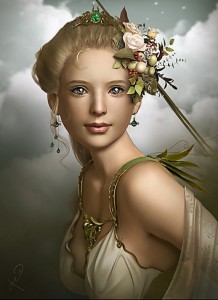 Demeter (Ceres) Greek Goddess - Art Picture
Demeter (Ceres) Greek Goddess - Art PictureDemeter (Roman equivalent is Ceres) is one of the largest and oldest goddesses of the ancient Greek pantheon. She is the daughter of Cronus and Rhea, sister of Zeus, Poseidon, Hades (Roman equivalent is Pluto), Hera and Hestia. Known as the Goddess of harvest, fertility, agriculture and vegetation soil, protector of the land and its products, mother of cereals (hence her name) and mainly wheat.
The birth of Demeter as the sister-dates goes back to the early years of theogony and accurately to the time when Cronus, son of Uranus, claimed and occupied by force the authority of the world.
The fate of the blonde and beautiful daughter of Rhea, exactly after she came to the world, was harsh. The small Demeter, like her brothers, ended up to the stomach of the heartless father, and was liberated only when her younger brother Zeus with his trick (magic potion from Metis) managed to fool him.
Demeter as goddess differed significantly from the other goddesses. Smart and attractive, had renounced from the beginning her divine abode. She never lived on Mount Olympus, but to the temples specially dedicated to her, close to those who believed and worshiped her.
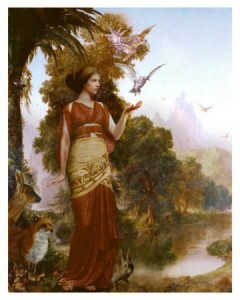 Demeter (Ceres) Greek Goddess - Art Picture by Howard David Johnson
Demeter (Ceres) Greek Goddess - Art Picture by Howard David JohnsonThe goddess of agriculture, discreet, modest and timid enough, had gained very early the sympathy and favor of the other Olympian gods. Her capabilities, skills and value had been recognized by all, while her personality and character demanded a special approach, special understanding and respect.
Demeter, in the sentimental area, was one of the hardest and snobbish goddesses. Although she was not very strong and rigid to her beliefs, she did not succumb easily in “love attacks”, even when the candidate lovers were very remarkable.
Poseidon and Zeus were two of the small number of known and aspiring conquerors of her. They both persistently persecuted her and finally managed to seduce her applying various misleading tricks.
Zeus was the first of the two brothers who tried to win. Although he suddenly fell in love with Demeter, he did not crave and besiege her as much as he did to Hera. The conscious and constant resistances of his sister made him think of cheats to trick her. Zeus transformed into a bull and managed to outwit her and from their union Persephone was born, the one and only beloved daughter of Demeter.
 Demeter (Ceres) Greek Goddess - Art Picture by jjlovely
Demeter (Ceres) Greek Goddess - Art Picture by jjlovelyPoseidon was the second of two brothers who attacked Demeter with sexual purposes. The goddess in order to avoid it morphed into mare and hid in the flock of Apollo Onkiou’s son. Poseidon, being brilliant, did not waste any time to perceive the trick. Without losing any time, he morphed into a horse, chased her and mated with her. A daughter (who was not allowed to pronounce her name) and a horse with black mane (Arion) were the fruit of their love.
Demeter after her brother’s behavior, felt betrayed and cheated. Unable to drown her anger, she became vengeful goddess until she flushed her hatred and fury in the river Ladon and renamed herself to Lucia.
The Olympian goddess, beyond the erotic match with her two brothers, accepted and loved passionately a young mortal. At the wedding of Cadmus and Harmony, Demeter met the handsome Jason and immediately fell in love with him. Without inhibitions and shyness, she left the wedding with him and in a well plowed field she delivered herself in his arms. After their sexual union, Demeter and Jason returned to the wedding with obvious signs of their act. Sludge in the arms and legs, made all the wedding guests to understand what had happened and be very angry too.
 Persephone - Daughter of Demeter (Ceres) Greek Goddess - Art Picture
Persephone - Daughter of Demeter (Ceres) Greek Goddess - Art PictureEspecially Zeus, who did not like the goddesses to mingle with mortals, reacted violently to that association. He stroke Jason with a thunder, and after some time, the seed of Jason from his association with Demeter came to light, the small Ploutos (Wealth). The death of Jason was not the only evil act that Demeter experienced by Zeus. Even greater calamity came when she lost her only daughter, Persephone, after secret cooperation between Zeus and Hades.
Persephone was a sweet girl, glamorous and above all very beautiful. The youth, the luster and freshness fascinated all who came across and many were those who wished to conquer her. Even Hades, the god of the Underworld, could not stay unmoved by her individual appearance of qualifications, who from the first moment he saw her, he wanted to make her his wife.
Respecting even their close family bonds that tied him with Demeter, he first came into contact with Zeus to consult him and then decided to kidnap her. At some point in time, Persephone had come out to play along with the daughters of Uranus in a meadow full of flowers.
 Hades kidnapping Persephone - Art Picture by Jynette Tigner
Hades kidnapping Persephone - Art Picture by Jynette TignerFull of joy as she ran from one place to another, picking violets, lilies and hyacinths, she suddenly saw a beautiful flower that really caught her attention. It was a narcissus who had a hundred flowers and its fragrance spread all over the prairie. The existence of this dazzling flower was not random that day. His presence in this meadow was a product of the cunning goddess Gaia who wanted to help Hades seduce her beautiful niece.
The little daughter of Demeter, serving the purposes of Gaia without knowing it, was not at all indifferent to this extraordinary spectacle. She was captivated by the special glow of the flower, wanted to acquire it, and for that reason she brought her two hands to touch it in order to pull it off.
 Demeter mourning and searching for Persephone - Art Picture by Jynette Tigner
Demeter mourning and searching for Persephone - Art Picture by Jynette TignerImmediately after doing so, the earth opened and from within, Hades sprung with his golden chariot and immortal horses. Persephone tried in vain to resist the kidnapping. The god of the Underworld, being cold hearted, was not moved by the tears and begging of her. He grabbed her by force, boarded her to the chariot and drove to the endless dark of his kingdom.
Throughout the route, Persephone cried with heartbreaking voice trying to make her abduction perceivable, but it was very difficult. The speed of horses as well as the huge distance and chaos that separate the two worlds did not make it easy for incident to be revealed. Only Demeter managed to reach the echo of the voice of her daughter but not in time.
 Demeter (Ceres) Greek Goddess - Art Picture by Shanina Conway
Demeter (Ceres) Greek Goddess - Art Picture by Shanina ConwayDemeter was a faithful and devoted mother to her daughter. Tender and sweet, she had a particular weakness for Persephone which was reflected in their relationship.
When Hades abducted Persephone, Demeter was really upset. The heartbreaking voices of her daughter who reached her ears, made her worry and take action. She ripped the cover of her head, removed her ornaments, put a black veil as a sign of mourning and poured out to look for her. For whole days she was running on land and sea seeking for Persephone. For about a week no one told her the truth and no omen had been revealed. She was getting frustrated…
Holding lighted torches, Demeter continued wandering with no sleep, bath and food. Although visibly weary, she did not abandon her efforts, but continued searching with determination.
 Demeter (Ceres) Greek Goddess - Art Picture by Todd1000 (Amy Adams as Demeter)
Demeter (Ceres) Greek Goddess - Art Picture by Todd1000 (Amy Adams as Demeter)The ninth day she meets Hecate on the road. She informs Demeter that she also managed to hear the harrowing voices of Persephone, but she does not know the reason or the offender. Coming into contact with the desperate mother, Hecate becomes sensitive and decides to help Demeter. She proposes that they should speak to Helios, because he was the only one, acting as a spy of gods and humans, who could reveal them the truth.
Helios does not remain unmoved, having a desperate mother in front of him. Faced with her agony, he sympathizes with her and decides to reveal the perpetrator of the abduction. He names Hades as the perpetrator and additionally accuses Zeus as responsible, because Zeus gave him the permission and consent, to take the beautiful Persephone as his wife.
 Demeter (Ceres) Greek Goddess - Art Picture by Gwendolyn Malfoy
Demeter (Ceres) Greek Goddess - Art Picture by Gwendolyn MalfoyDemeter listening to the words of Helios gets furious and decides not to return to Olympus to ask for explanations. The comforting words of the glowing god make her more stubborn and unyielding and she prepares to continue her searches. During her wanderings nobody can recognize her. The fatigue and exhaustion have changed her divine incarnation so that no one and nothing can be aware of her.
Sometime after covering great distance, the hurt mother arrives at Eleusis, near the palace of the smart king of Keleou. The exhausted goddess is sitting beside the well of Virgo, under an olive tree, to take a little rest. There she is confronted by the four daughters of Keleou (Kallidiki, Kleisidiki, Dimo and Kallithoi) who had gone to the well with pitchers to get water. In order to not be noticed, Demeter is transformed into a very old woman and enlists the help of four girls.
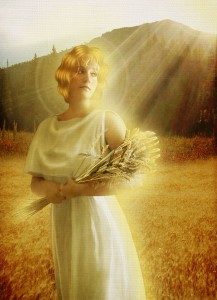 Demeter (Ceres) Greek Goddess - Art Picture by JinxMim
Demeter (Ceres) Greek Goddess - Art Picture by JinxMimThe girls watching the plight of the old woman pitied her and offered to help her. They called her in the palace but prior to the invitation, they request some information about her ancestry. Demeter accepts the invitation but is determined not to reveal her true self. She makes up a fairytale and tells them that her name is Dido and that she originates from Crete. She also tells them that pirates kidnapped her in order to sell her, but she managed to escape and after wandering she ended up in this place having dire need of support and help…
The four daughters of Keleou are touched by the old woman’s story and having already gotten from her further information on qualifications around the housework and child rearing, they decide to take her with them to support her.
On the way, the beautiful daughter of Keleou, Kallidiki undertakes the task to orientate the old lady around the area. She presents her the city, the large country houses and assures her that it will not be easy to find accommodation and work in one of them. She also declares that her parents, now in their old age, have just born a boy that definitely needs extra care from a qualified woman.
 Demeter (Ceres) Greek Goddess - Art Picture by Midori Harada
Demeter (Ceres) Greek Goddess - Art Picture by Midori HaradaArriving at the palace, the four girls leave the goddess and run to tell their mother about the incident. The queen is listening with great attention the stories concerning the old lady and she willingly accepts to help and sends her daughters to call her. The daughters run out with happiness to Demeter, take her and escort her to the palace. Demeter with covered face and black clothes, passes the threshold and confronts the queen and her little son who sat opposite of her on a throne.
Demeter, on entering the palace, the inner space is filled with light and her head is reaching on the ceiling. The queen is initially upset and frightened, but then the awe causes her to get up and offer the throne to the dazzling unknown stranger. Demeter unwilling yet to be revealed, nor to infringe the etiquette requires the respect and reverence of anyone to the face of a queen, refuses the honorary position offered by the queen and is sitting on a low stool covered with sheepskin which is given by maid Iamb. The difficult task she has undertaken and the despair do not leave Demeter to express herself freely. Silent and quiet, obviously miserable and desperate, standing still with eyes thrown to the ground.
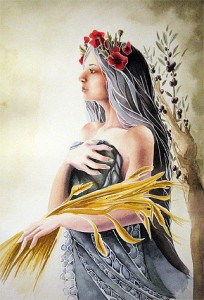 Demeter (Ceres) Greek Goddess - Art Picture by Natalie Busutti
Demeter (Ceres) Greek Goddess - Art Picture by Natalie BusuttiThe atmosphere is very heavy and the maid Iamb in order to lighten it and give it a more cheerful tone starts making jokes. The cute teasing is affecting everyone in the room. Even Demeter, lured by the overall fun atmosphere, begins to laugh. The queen Metaneira rejoices with the, even temporary, change of old woman's mood. Full of kindness and sympathy she offered her a cup of wine but Demeter, because of mourning, does not accept it. On the contrary, due to exhaustion and hunger that lasted several days, she prefers to ask the Queen for barley and water. The mother of four beautiful girls did not deny this and immediately commands someone to prepare it and to bring it to her.
Demeter eats the prepared meal with bulimia and finishing, she announces her intention to take the upbringing and education of the young son of the royal family, Demophon.
 Demeter (Ceres) Greek Goddess - Art Picture by Perlamarina
Demeter (Ceres) Greek Goddess - Art Picture by PerlamarinaWith great joy and realizing the special nature of the foreign old lady, queen Metaneira willing trusts her only son in her hands. Demeter in the form of unhappy old woman, takes on her side big commitments around the upbringing and care of the child. She promises before all, that nothing will be missing from the child and that it will never be sick.
The statements of the foreign old lady leave everyone speechless. Nobody, at this moment, can imagine that behind these very consequential and binding words lies a goddess. All of them are fascinated by something particular that is emitted by this foreign woman, but no one can understand why. The raising of Demophon and special treatment on the part of the old woman will interpret what they see so far amazing and inexplicable.
Demetra undertakes immediately the upbringing of the child with a truly unique and special way. Without breastfeeding and without feeding, she anoints it daily with ambrosia, she blows it with her breath at the night and puts it on a high heat to make it durable and immortal. The offer, on her part, of such a gift is for her the best gratitude and the best reward towards the royal couple for the good things that were given to her.
 Demeter (Ceres) Greek Goddess - Art Picture by Zeoxisace
Demeter (Ceres) Greek Goddess - Art Picture by ZeoxisaceThe upbringing of Demophon continued with the same tactics until one day, quite suddenly, Metaneira appears and understands the strange method of the foreign woman.
The queen is shaken by the sight and strongly protests. Not knowing the divine origin of the unknown old woman, she gets really angry with her behavior and begins to fire threats in a very ugly way. Demeter, after the reactions of the queen, is furious and decides to reveal her identity. She does not accept any compromise and shows, from now on, the path and destiny of Demophon.
 Demeter (Ceres) Greek Goddess - Art Picture by Zelda
Demeter (Ceres) Greek Goddess - Art Picture by ZeldaMoreover, she requires the construction of a large temple with an altar in her honor, which will be built in accordance with her wishes under the walls of the city on the hill near the Kallichoro well. Finally, she announces the presence of certain feasts in her honor, so in the future, her worship would be established in their places.
Demeter does these statements, takes her true form, stands up and leaves. The queen, as the surrounding crowd, are stunned and bewildered. The little boy perhaps realizing the substantial loss of his nanny starts crying inconsolably.
The realization of the wishes of the goddess is now a primary concern of the royal family. The next morning, king Keleos is informed and gathers all the people to announce his intentions. Without losing any time, he commands the building of the, dedicated to the goddess Demeter, temple and asks for the soonest possible completion.
 Demeter (Ceres) Greek Goddess - Art Picture by Arpiwane
Demeter (Ceres) Greek Goddess - Art Picture by ArpiwaneDemeter, frustrated and desperate, shuts herself in the newly built temple and refuses to return to Olympus. Incensed by the calamities which have found her and from the adverse situations she experienced and continue experiencing, sends to the whole world the greatest misfortune that could ever come. She causes the seeds to stay hidden in the ground and makes the land barren and unable to germinate.
Zeus watching that humanity would soon disappear, is forced to raise and take action. He sends primarily the graceful Iris at Eleusis to convince Demeter to return to Olympus, but in vain. The goddess was determined to not change attitude and behavior, and sends Iris back idly. She also sends back all other gods who went with their gifts to visit and try to persuade her. The father of the gods, watching his efforts end in vain, confronts a real impasse.
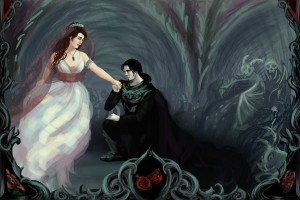 Hades farewell to Persephone, while offering her to eat a sweet pomegranate seed - Art Picture by Jynette Tigner
Hades farewell to Persephone, while offering her to eat a sweet pomegranate seed - Art Picture by Jynette TignerUnable to think of anything else that could bring positive effect, he decides to personally mediate. He sends Hermes (Roman equivalent is Mercury) to Hades (Roman equivalent is Pluto) and manages to convince him to set Persephone free and allow her to return to her mother. Hades obeys the words of his younger brother and agrees to release his beautiful wife, but did not disclose his sincere intentions. Saying goodbye to Persephone, the ruthless god of the Underworld, offers her to eat a sweet pomegranate seed, so that she will not ever want to return permanently to the mother. After the farewell, Hermes gets her beautiful daughter, readies his chariot and goes to her mother at Eleusis.
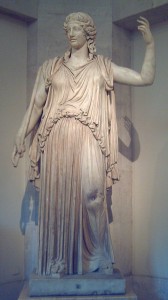 Greek Goddess Demeter (Ceres) Statue Madrid-Capitolio (Museo del Prado)
Greek Goddess Demeter (Ceres) Statue Madrid-Capitolio (Museo del Prado)Demeter, facing her beloved lost daughter, falls in her arms overflowing with joy. She can't believe the arrival of her daughter, as she can't imagine a fair deal between the two brothers.
Knowing Hades obsession and conscious of selfishness and stubbornness that distinguishes him, asks her daughter if her brother, before leaving her, gave her anything to eat. Persephone, innocent as she was, describes in detail to her mother the incident with the pomegranate.
Demeter, sadly understands the importance of the event and says to her daughter that from now on, it is required to stay one third of the time near her husband and the remaining two-thirds with her mother.
The result, although it is not the best expected, is not dissatisfying for mother and daughter.
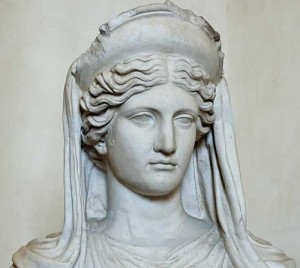 Greek Goddess Demeter (Ceres) Statue - Detail from a statue at Kindros, carved around 350 BCE
Greek Goddess Demeter (Ceres) Statue - Detail from a statue at Kindros, carved around 350 BCEBeing so happy, to be with each other after so much adventure and suffering, they accept, in the mean time, the visit of Rhea at the request of Zeus. The mother of the gods, being happy and satisfied with the final reunion, is proposing as her son's mediator, the return of the two (Demeter and Persephone) to Olympus. Nobody denies this compromise.
Demeter accepts the call and hears the request of Zeus to put an end to the calamities that she sent. Upon their return everything is done as before and nature is in full bloom and bears fruits.
Demeter, happy again, will not only stand to the level of nature and fertility, but also undertakes to teach kings sacred ceremonies and to introduce them to the mystery cults.
Please leave a comment if you liked this article 🙂
All pictures are also uploaded in Albums on the Greek Mythology Pantheon page on Facebook, visit us at :


41 COMMENTS
Very nicely written and nicely illustrated.
I’d just like to mention that while not as glamorous as Zeus throwing lightning bolts or captivating as Aphrodite, Demeter was one of the most important gods to the people as she was responsible for the success of the harvests. So while often forgotten about these days in her time she was extremely important.
Thank you very much Lodewijk 🙂
I totally agree with you that she was one of the most important gods/goddesses. Back then, the outcome of the harvest (successfull or not) was defining if the people of a certain area would starve or not.
cool
I’m doing a project on Demeter and I have to say that this article definitely helped me. Wonderful.
I am very glad it helped you 🙂
I wish you luck and success on your project!
me too
thanks this is going to help me alot in school!
You are welcome!
I hope you get good grades at school 🙂
i had to research demeter for a project i think this is really useful information of her i thank who ever wrote this
Thank you very much for your kind words 🙂
what is her words of wisdom? Can you please help me?
it is love babe
thank you so much im doing a project on Demeter and this helps a lot
Thank you! that was very informative this is going to help my assignment a lot!
I enjoyed this article very much and learning about this wonderful goddess, Demeter, and understanding more about Greek Mythology, which I love. Thank you!
this iformation was reALLY HELPFUL FOR MY PROJECT I THANK HOW EVER MADE THIS PAGE.
i need to noe more about demeter i have got a project in school…can u help me plsss
When was this published?
It was published on 28 May 2013.
Yeah bro, this was good.
This information really help me understand the life of A Godess Demeter
Thank you for this.
This was awesome! It just so happens my brother took the test and found his Greek God was Hades! Who is Demeter (my) brother as well! ? its amazing how much I can really relate to this, I laughed because I really read some things about myself! I’m also a Taurus/Earth sign so this is DEFINITELY on point, Asé
The mother must allow and let go of daughter. Seems like a good compromise. I work with mother daughter.
This is my name Dimitra I found out my mother got my name from her. This means so much for years I knew my name ment the great goddesses of the harvest, but this article opened a whole new world. Being an African American women it was so hard to for people to understand my name even me I used a nickname for years thank you for helping me embrace my name?
I am very happy to hear that from you, Dimitra 🙂 You are welcome 🙂
Very well done! This was great for my research project. Lovely pictures & great, well-presented information. Kudos for your quality work.
This is a very good recourse to use, it helped me a ton on my mythology essay
Please tell me what offerings I can leave for my Demeter statue and how often you are supposed to leave the offerings and for how long each time ? Thank you. The information was very helpful
YES. enjoyed this article. I loaded a pic onto my home phone page!
Can anyone tell me what my last name neans? Lynna KARANUTSOS ??
Im 1/4 Greek perhaps..a little GODDESS toooooooooooooo!
i’m trying to find ceres personality trait
so do anyone know it? i would realy like to know
My daughter died at age 22. Her email address included Ceres. I never knew why she chose it. Thank you for insights
I am very sad to hear this 🙁
I wish health and happiness to the rest of your family.
This helps a lot. The art is cool by the way.
I’m glad you created this web sight. Helps for my project in school.
I love the pictues the most, they help me get a kind of picture in thought.
the pictures help me kind of under stand what they might look like.
I was helping my wife choose a name for her new business. She started with the idea of a Cornucopia but it really didn’t fit with the clothing and other interior design products she plans to sell. Your website was instrumental in helping her choose Ceres Designs as the name of her business. In case you are curious why we chose Ceres rather than Demeter it’s because Ceres is easier for people in Easter Europe to pronounce. We live in Ukraine.
Does ceres have sayings? Like a famous line of her? Answer ASAP pls. 😊 Because i’m gonna play her role and i need a famous saying of her.
Thank you for this very informative story, along with the beautiful art. My birthday is August 24th, and in reading “The Spendor Before The Dark” by Margaret George, she mentions in passing that August 24th was the day that Emperor Nero, whom the book was written about, paid homage to the goddess Ceres and her daughter. So, intrigued to learn more about this mythical woman whom the Roman’s so revered, I logged onto your site and was not disappointed. You mention Virgo, which happens to be the astrological sign being ushered in on that day as well. Thanks again, from Linda.
You are welcome! 🙂
Thank you so much for this information!! Ceres (aka Demeter) has a strong placement in my birth chart. Leaning more about her is so helpful.